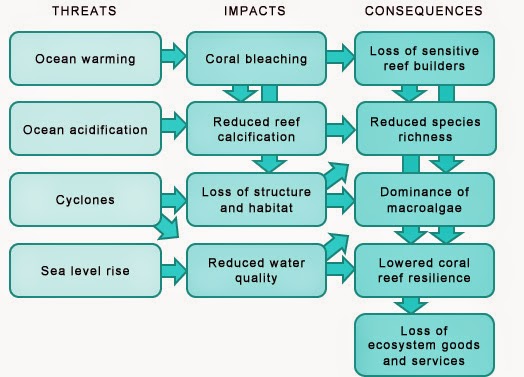The acidification of the ocean has has a great impact on coral reefs around the world.
Figure A represents healthy coral
Figure B represents unhealthy coral
Ocean acidification is degrading coral reefs around the world.
Here is an example of the degradation of the reefs in the Floida Keys.
Even within the last 30 years the effects of climate change can be seen.
High carbon emissions are directly related to an increase in carbon in the ocean.
The atmospheric carbon is absorbed into the ocean and becomes carbonic acid.
The increase in carbonic acid results in the ocean becoming more acidic.
Coral reef growth is heavily impacted by increases in acidity.
Levels of ocean acidity have been on a steady rise
Carbonic acid reduces the level of calcium in the ocean when the two react with each other.
Coral and many other forms of marine life rely on calcium to form skeletons and exoskeletons.
20% of coral reefs around the world have already been lost in the last few decades.
250 million people also depend on coral reef ecosystems for their livelihood around the world.
27% of coral reefs are also at risk of completely disappearing in the future as well.
Coral reefs play a large role in the ecosystem of the ocean
Events that are a result of climate change effect reefs in many ways
Coral and other small marine animals like phytoplankton and zooplankton rely on the ability to
form skeletons and exoskeletons
Coral and these other organisms are also the base of many food chains for ocean life
If the growth of animals at the base of a food chain are impacted it can have
long reaching consequences to animals higher up in the food chain as well
If you look at this image you can see an example of how large and interconnected
an ocean ecosystem can be.








No comments:
Post a Comment